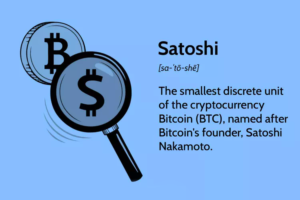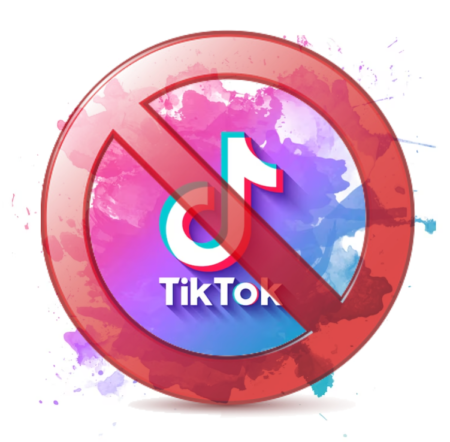What is a Satoshi
Satoshi in Bitcoin Explained: What It Is and How Much It Is Worth

What Is a Satoshi?
The satoshi is the smallest denomination of the cryptocurrency bitcoin. It is named after Satoshi Nakamoto, the Bitcoin creator(s). The satoshi to bitcoin ratio is 100 million satoshis to one bitcoin.
KEY TAKEAWAYS
- A satoshi is the smallest denomination of bitcoin, equivalent to 100 millionth of a bitcoin.
- Bitcoins can be split into smaller units to facilitate smaller transactions.
- The satoshi was named after the bitcoin founder(s) known as Satoshi Nakamoto.
History of the Satoshi
The satoshi represents one hundred millionths of a bitcoin.1 Because bitcoin has increased in value exponentially, smaller denominations are needed for smaller transactions. Small denominations make bitcoin transactions easier to conduct while making them readable by people.
For example, if you bought a $100 item with one bitcoin, your charge might ring up as .0219757 BTC (if BTC equaled $21,975.70). However, it’s easier to understand 219,757 satoshi.
Where Did the Name Satoshi Come From?
The satoshi is named after Satoshi Nakamoto, the anonymous person (or persons) that published the white paper in 2008 that jumpstarted the development of Bitcoin and popularized crypto. The whitepaper “Bitcoin: A Peer-to-Peer Electronic Cash System” described a peer-to-peer network as a solution to the double-spending problem found in previous cryptocurrency concepts.2
What Is Double Spending?
A physical bill or coin can only exist in one place; therefore, you cannot use it for two transactions. One person receives a physical item, and the other loses it. Cryptocurrency is a representation of ownership recorded in a database—without specific measures taken to prevent it, one user can transfer ownership of one asset more than once. This is called double-spending.
When you can double spend, you can give an item to someone in exchange for goods or services and use it again for another transaction. The peer-to-peer ledger and transaction verification system, or consensus mechanism, solved the problem of transferring the ownership of a digital currency so that a user cannot spend the same asset twice.3
Consensus mechanisms verifying a database change weren’t brand new when Bitcoin was conceived. However, they made the idea of decentralized currency verification and control achievable.
Using Satoshi
While not officially part of a major currency pair, bitcoins and satoshis can be converted to and from other currencies. Cryptocurrency exchanges allow you to convert between fiat and cryptocurrencies or conduct other transactions.
Generally, transactions involve depositing dollars, pounds, or other currencies into an account in one of the exchanges. The money is converted to satoshis or bitcoins, which you can use at merchants that accept them as payment. Not all online merchants accept all or any forms of cryptocurrency—make sure you research the merchants where you want to use your satoshi and bitcoin and make sure they accept them.
How Is Satoshi Different From Other Digital Denominations?
Many cryptocurrencies use denominations specific to their designer’s preferences. For example, Bitcoin uses only the satoshi as a denomination, while Ethereum uses several.14 Both versions make it easier to conduct transactions in amounts that are not equal to the currency’s market value, but their difference in denominations can be confusing if you’re new to cryptocurrency.
To get the satoshi to U.S. dollar rate, divide the current market price by 100 million. To get the number of satoshi per dollar amount, divide the dollar amount you want by the satoshi to the dollar rate.
Satoshis can be referred to using the metric system to make it easier to understand:
- Millibitcoin (mBTC) = 100,000 satoshi
- Microbitcoin (µBTC) = 100 satoshi5
Ethereum uses different conventions for its equivalent values, with wei being the smallest unit of ether:
- 1 wei = 1 quintillionth of 1 ether
- 1 Gwei = 1 billion wei6
Ether has more denominations, but these are used the most. Both bitcoin and ether have different market values, so one satoshi has a different monetary value than one ether.
How Many Dollars Is 1 Satoshi?
Satoshi value changes with bitcoin’s market value. For example, on Feb 12, 2023, Bitcoin had a market spot price of $21,970.70. At that time, one satoshi was worth $.000219707.78
How Much Is 10,000 Satoshi Worth?
On Feb. 12, 2023, one bitcoin had a spot price of $21,970.70. If you had 10,000 satoshi at that time, it was worth $2.2078
How Can I Buy Satoshi?
If you’re only looking to exchange money for cryptocurrency, you can buy satoshi on an online cryptocurrency exchange. Most exchanges list markets for several cryptocurrencies and their associated denominations, with an option to purchase or sell them.
The Bottom Line
The satoshi is the lowest denomination of bitcoin—there is 100 million satoshi per bitcoin. The denomination was named after Satoshi Nakamoto, the person or group who invented Bitcoin. Using satoshi as a denomination makes it easier to understand small amounts of bitcoin because the cryptocurrency commands such a high value.
Investing in cryptocurrencies and other Initial Coin Offerings (“ICOs”) is highly risky and speculative, and this article is not a recommendation by Investopedia or the writer to invest in cryptocurrencies or other ICOs. Since each individual’s situation is unique, a qualified professional should always be consulted before making any financial decisions. Investopedia makes no representations or warranties as to the accuracy or timeliness of the information contained herein. As of the date this article was written, the author does not own cryptocurrency.
Freedom Walkers requires articles to use primary sources to support their work. These include white papers, government data, original reporting, and interviews with industry experts. We also reference original research from other reputable publishers where appropriate. You can learn more about the standards we follow in producing accurate, unbiased content in our editorial policy.
Bitcoin Developer. “Glossary: Denomination Bitcoins Satoshis: https://developer.bitcoin.org/glossary.html
Bitcoin Project. “Bitcoin: A Peer-to-Peer Electronic Cash System,” Page 2: https://bitcoin.org/bitcoin.pdf
Bitcoin Project. “Frequently Asked Questions,” Select “Security: Could Users Collude Against Bitcoin?: https://bitcoin.org/en/faq
Ether Homestead: Ether: https://www.ethdocs.org/en/latest/ether.html
BitsUSD. “Bitcoin Units & Denominations: https://bitsusd.com/bitcoin-units/
Ethereum. “Gas and Fees: https://ethereum.org/en/developers/docs/gas/
CoinMarketCap. “Bitcoin: https://coinmarketcap.com/currencies/bitcoin/
CoinMarketCap. “Satoshi: https://coinmarketcap.com/currencies/satoshi/








